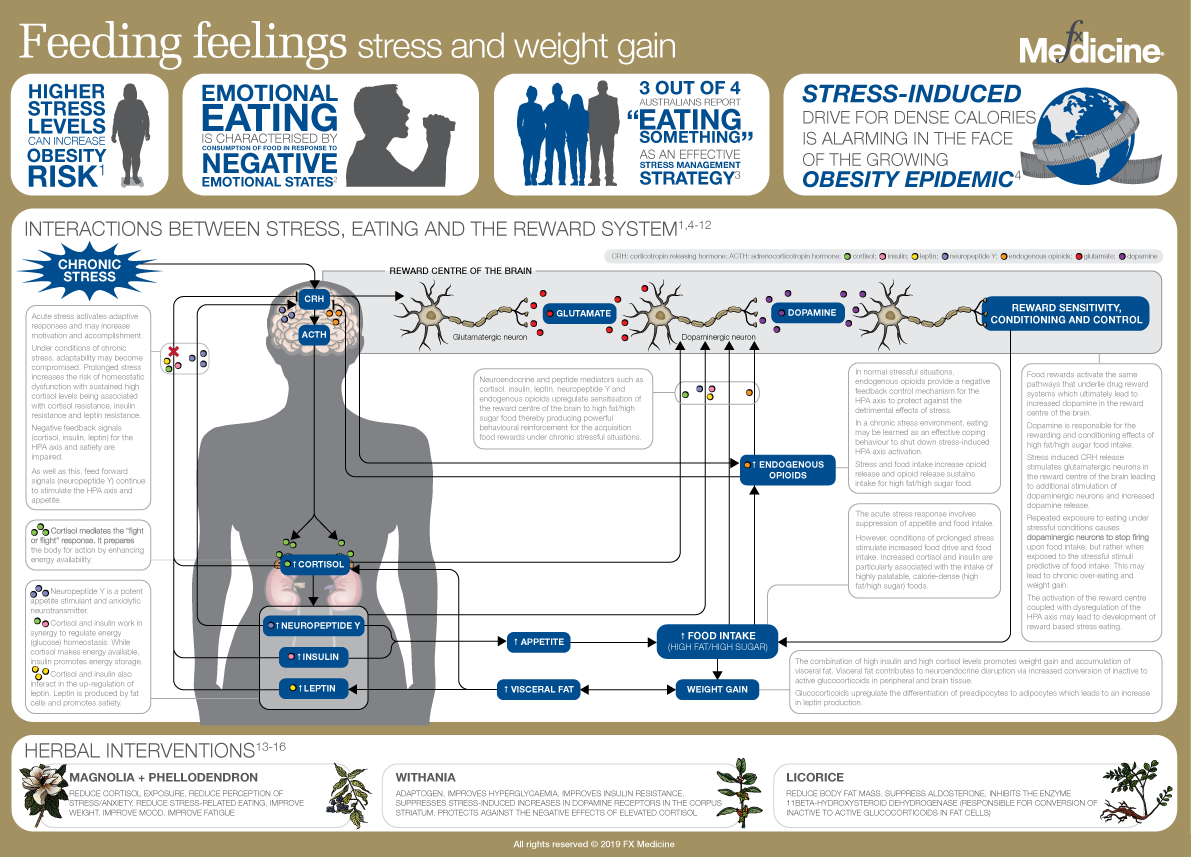
Defined as "abnormal or excessive fat accumulation that may impair health", obesity is a condition that is increasingly common. In Australia, 3 in every 5 adults are overweight or obese; with obesity representing an important risk factor for numerous life-threatening health problems including cardiovascular disease, type II diabetes, osteoarthritis and certain cancers.
The notion that stress plays an important role in the development of obesity is becoming increasingly apparent. As obesity continues to escalate as a health problem worldwide there is growing evidence that stress-related chronic stimulation of the hypothalamic-pituitary-adrenal (HPA) axis, resulting in excess glucocorticoid exposure, may play a potential role in the development of visceral obesity. This physiological response is commonly interrelated with an emotional attachment to food characterised by eating when dealing with negative emotions. Chronic stress may trigger and reinforce neural pathways leading to a vicious cycle of mood eating and stronger reactions to highly rewarding foods. By taking into account this systemic disturbance in homeostatic balance the clinical opportunity for successful weight loss is not only increased, but the wider health risks associated with obesity can also be better managed.
In this infographic we explore the critical relationship between chronic stress, alterations in HPA activity and obesity and offer important therapeutic considerations for better clinical outcomes.
References
- Mouchacca J, Abbott GR, Ball K. Associations between psychological stress, eating, physical activity, sedentary behaviours and body weight among women: a longitudinal study. BMC Public Health 2013;13:828. [Full text]
- van Strien T, Engels RC, van Leeuwe J, et al. The Stice model of overeating: tests in clinical and non-clinical samples. Appetite 2005;45(3):205-213. [Abstract]
- Stress and wellbeing in Australia survey 2014. Australian Psychological Society. Viewed 24 June 2016, https://www.psychology.org.au/Assets/Files/2014-APS-NPW-Survey-WEB-reduc...
- Adam TC, Epel E. Stress, eating and the reward system. Physiol & Behavior 2007;91(4):449-458. [Abstract]
- Tryon MS, Carter CS, Decant R, et al. Chronic stress exposure may affect the brain’s response to high calorie food cues and predispose to obesogenic eating habits. Physiol Behav 2013;15;120:233-242. [Abstract]
- Epel E, Lapidus R, McEwen B, et al. Stress may add bite to appetite in women: a laboratory study of stress-induced cortisol and eating behavior. Psychoneuroendocrinology 2001;26(1):37-49. [Abstract]
- Bose M, Oliván B, Laferrère B. Stress and obesity: the role of the hypothalamic–pituitary–adrenal axis in metabolic disease. Curr Opin Endocrinol Diabetes Obes 2009;16(5):340-346. [Full text]
- Volkow ND, Wang GJ, Fowler JS, et al. Food and drug reward overlapping circuits in human obesity and addiction. Curr Top Behav Neurosci 2012;11:1-24. [Abstract]
- Spiegel K, Leproult R, L’Hermite-Baleriaux M, et al. Leptin levels are dependent on sleep duration: relationships with sympathovagal balance, carbohydrate regulation, cortisol, and thyrotropin. J Clin Endocrinol Metab 2004;89(11):5762-5771. [Full text]
- Yau Y, Potenza M. Stress and eating behaviours. Minerva Endocrinol 2013;38(3):255-267. [Full text]
- Wand G. The influence of stress on the transition from drug use to addiction. National Institute on Alcohol Abuse and Alcoholism 2016. Viewed 20 June 2016, http://pubs.niaaa.nih.gov/publications/arh312/119-136.htm
- Stephens MAC, Wand G. Stress and the HPA axis: role of glucocorticoids in alcohol dependence. Alcohol Res 2012;34(4):468-483. [Full text]
- Talbott SM, Talbott JA, Pugh M. Effect of Magnolia officinalis and Phellodendron amurense (Relora®) on cortisol and psychological mood state in moderately stressed subjects. J Int Soc Sports Nutr 2013;10(1):37. [Full text]
This image by FX Medicine is licensed under a Creative Commons Attribution-NonCommercial-NoDerivatives 4.0 International License.
More information about how to share/use the infographics for personal use.
If you interested in using any FX Medicine content for commercial use please contact us.
DISCLAIMER:
The information provided on FX Medicine is for educational and informational purposes only. The information provided on this site is not, nor is it intended to be, a substitute for professional advice or care. Please seek the advice of a qualified health care professional in the event something you have read here raises questions or concerns regarding your health.



